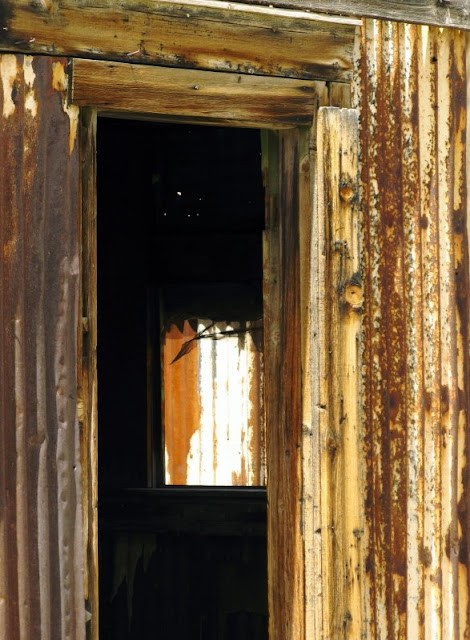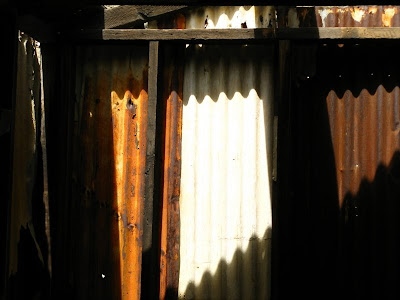 I won't go into the history of the Leadfield mining district in Titus Canyon, CA, except to say that the sign does not give the entire history, and that real copper and lead discoveries were made there in the early 1900's. See links below.
I won't go into the history of the Leadfield mining district in Titus Canyon, CA, except to say that the sign does not give the entire history, and that real copper and lead discoveries were made there in the early 1900's. See links below. A photo overview of part of the Leadfield town, with colorful grey to pale orange mine dump. I didn't knock around on this dump, so I don't know what was being brought out of the ground, but the grey matches the color of the local limestone.
A photo overview of part of the Leadfield town, with colorful grey to pale orange mine dump. I didn't knock around on this dump, so I don't know what was being brought out of the ground, but the grey matches the color of the local limestone.
A window through a door.

Rust and paint.

The view from one of the cabin windows.

In between.

Hinge.

An attempt to keep people out of one of the historic mine adits.

Sun on a rusty wall.

Window and wall.
Death Valley Ghost Towns: National Park Service
Leadfield, California: Ghost Town Explorers
Leadfield, California: Wikipedia
Leadfield Ghost Town: Mojave.net
3 comments:
When I was there spring a year ago, one of the group coming out of an addit (upstream from the town site, just below where the road comes down to the valley floor) told me that that mine was after silver... does that sound reasonable? I know Pb and Ag are often associated, and there has been minor Zn-Pb-Ag production in the western Cascades. But I couldn't find or recognize any familiar minerals in that addit's dump.
Although most of what I could find about Leadfield mentioned only lead and copper, that last link says that ores in Western Lead Mine's tunnels averaged 8 to 30% lead and 7 ounces per ton silver. Silver often runs with lead, sometimes being contained within galena. If the ores were oxide ores, the silver-bearing minerals might not be easily recognizable; if sulfides, they might have included the ruby silver minerals, proustite and pyrargyrite.
I think I know which adits you are referring to. I was so busy looking to the left when coming down from Red Pass, trying to see the big dump to the south of the road, that I hit bottom going over a rock. It looked like there had been an old tramway going south higher up the mountain, with part of the cable still there.
Too bad I didn't look at any of the dumps. It's possible they've all been picked over. I try to find the "goodie pile" that the oldtimers left to show people what they were digging on. When sampling (not in a park!), it's good to only take a small part of a goodie pile. They do get depleted over the years, though.
The western Cascades Ag is solid solution (mostly) in galena and sphalerite. I had some DV samples I collected as an undergrad (pretty much everything I owned was wiped out in a flood some years back, so I don't now), but none on this trip. Thanks for the info!
Post a Comment